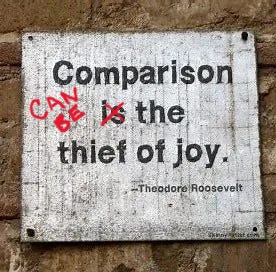Life requires us to compare. We make decisions about how to advance by comparing our options. We adapt by comparing what we find to what we expected. Strategy is the art of making the right comparisons at the right time.
However, it is always a mistake to compare our lives to those of others. When we come out on the bottom, these comparisons give rise to destructive emotions: resentment, jealousy, and envy. Even worse is when we come out on top. We then feel pride and hubris. Pride goes before the fall.
Comparing to Others
A comparison of our lives with those of others is impossible. We do not know ourselves well enough, and we absolutely don’t know enough about the lives of others. Lives that look all bright and happy on the outside can be dark and tortured on the inside.
We envy others at the high points of their lives. But all lives have ups and downs. We don’t see what was sacrificed to get to the highs. We can’t know the cost of staying there. We do not see the pain of the inevitable fall from that place.
We fail to realize that those who rise to the top of their industry have a burden of responsibility that is crushing. They work constantly. Thousands of employees depend upon them. When we run a big business, we never own the business: the business owns us. Employees, investors, customers, vendors, banks, and the government all own a piece of us. From my experience building and running an Inc. 500 company, I can tell you, you don’t get a lot of sleep and you sacrifice your personal life and family relationships.
Paul Simon wrote a song called, Richard Cory. Here is its last part,
The papers print his pictures almost everywhere he goes.
Richard Cory at the opera, Richard Cory at a show.
And the rumor of his parties and the orgies on his yacht,
Oh, he surely must be happy with everything he's got.But I, I work in his factory.
And I curse the life I'm living.
And I curse my poverty.
And I wish that I could be.
Oh, I wish that I could be, Richard Cory.He freely gave to charity. He had the common touch.
And they were grateful for his patronage, and they thanked him very much.
So, my mind was filled with wonder when the evening headlines read:
"Richard Cory went home last night and put a bullet through his head."
We don’t know the lives of others. We cannot be envious of their success because we don’t know their pain.
Why Not to Compare
Our lives shape us so differently from one another that an accurate comparison is impossible. We start from different families with different individual temperaments. As teenagers, we are socialized in different cultures and get different educations. We prefer different books and entertainment. Once we begin making a living, we learn a variety of skills, see a variety of business environments, and are trained by a variety of individuals. We learn different lessons from life. Little of what we experience can be captured in any comparison.
What can be compared usefully is what we call “positions.” Positions are not places but paths. We can only know a small part of the paths of others. What we judge are a handful of aspects about those paths. Positions are intellectual tools, not reality. We must be conscious that our information is incomplete. The map is not the territory. It is a useful simplification, but we must know how to use it so we can make good decisions with our limited information.
How to Compare Positions
We compare our positions with others to understand the landscape, the competitive ground. We focus on paths, especially where they might go tomorrow. We want to foresee where those evolving paths might create openings. Those openings are our opportunities.
All paths have both ups and downs. We must use our path’s highs to prepare ourselves for our inevitable lows.
Keep reading with a 7-day free trial
Subscribe to Practical Strategy Based on Sun Tzu's Art of War to keep reading this post and get 7 days of free access to the full post archives.





